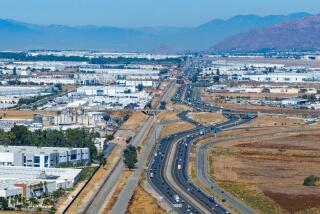Complaints Force Panel to Reconsider Limits on Businesses : Reseda: People line up to denounce what they say is a secretive process and a flawed notion of what they want their neighborhood to be.
The Los Angeles City Planning Commission, faced with overwhelming opposition from merchants and residents, on Thursday told its staff members to re-evaluate nearly every aspect of the proposed Reseda Central Business District revitalization plan.
The plan came before the commission as a routine item, awaiting final approval before being forwarded to the City Council.
But people lined up at the Van Nuys Womanâs Club, speeches in hand, to decry what they said was a secretive process and a flawed notion of what they want their neighborhood to be.
âI would like to know who is for this plan,â said Bernard Richter, whose family owns a block of property in central Reseda. âThis plan is a disaster. Reject it. Turn it back. Please, God help us.â
Planning Commission President William Luddy, having heard 40 people blast the plan, which called for pedestrian walkways, limits on certain kinds of businesses and clusters of apartments next to stores, shook his head and smiled.
âUnanimity. People donât like the plan,â he said.
Luddy and the rest of the commission ordered the city planning staff to review the entire Reseda plan and hold another public hearing within 120 days. No one spoke in favor of the plan. Commissioner Fernando Torres-Gil said he had never heard such a consensus of opposition on any neighborhood specific plan.
The plan, devised by planners and a citizens advisory committee appointed by Councilwoman Joy Picus, has been developed over two years. But business owners said Thursday that they were not notified of committee meetings, or specifics of the plan, until after a public hearing was finished May 3.
âEverything Iâve built over 50 years theyâre about to disallow, and they give me three minutes to talk about it,â said Richter, whose property houses a carwash and several auto-related businesses that could not expand under the proposed plan.
Key elements of the plan that were repugnant to Reseda business owners were provisions aimed at shaping the kinds of future businesses that would be allowed to locate there. Under the plan, current shop owners could remain or sell their businesses, but no new taxicab businesses, car repair facilities, parcel delivery services, trade schools, pawnshops or massage parlors could move into the central Reseda business district. Existing businesses in targeted categories could not expand.
Despite the fact that they will be permitted to remain, people representing targeted businesses expressed outrage at being considered âobnoxiousâ and unwanted elements in Reseda.
âHow am I supposed to tell my children and grandchildren that their family has perpetuated a legacy for them to inherit an undesirable business?â asked Howard Hilborn, owner of a shop that restores interiors for Rolls-Royces and classic cars.
Antiquarian bookstore owner Jerry Blaz said he was shocked at having his business âdeclared a pariah usageâ at a time when society is trying to encourage people to read and love literature. Some businesses such as his, classified as a secondhand store, were removed from the targeted list before Thursdayâs meeting.
âThis will bring civil disobedience to Reseda,â Blaz said. âWe will not stand for it.â
The plan, as designed, would require future business owners to dedicate property for pedestrian walkways and landscaped courtyards. Residents objected that requiring such areas would discourage people from establishing new businesses, and that the spaces would simply serve as places to congregate for derelicts and people who deface property with graffiti.
âYou cannot generate, artificially, pedestrian traffic,â said property owner Harold Minton. âPeople do walk,â he said, but only in enclosed malls that are air-conditioned in summer and heated in winter.
Speakers suggested a variety of alternatives for improving the character of commercial Reseda, such as improved security, tight enforcement of sign ordinances, consistent business facades and colors, improved landscaping and vertical, instead of parallel, parking.
Many suggested identifying a theme for Reseda, such as a Reseda flower, a Western theme or a turn-of-the-century motif, that could be used along sidewalks, in landscaping plans and in sign designs.
They bristled at the idea of establishing neighborhoods with a mix of residences and businesses, as suggested by city planners, because they said it would compound parking problems and endanger children who would use parking lots to play.
More to Read
Sign up for Essential California
The most important California stories and recommendations in your inbox every morning.
You may occasionally receive promotional content from the Los Angeles Times.










